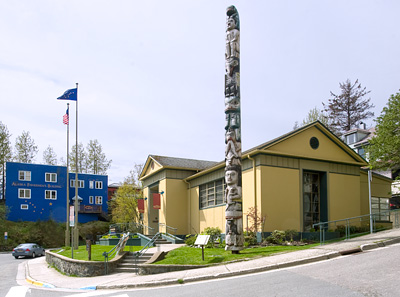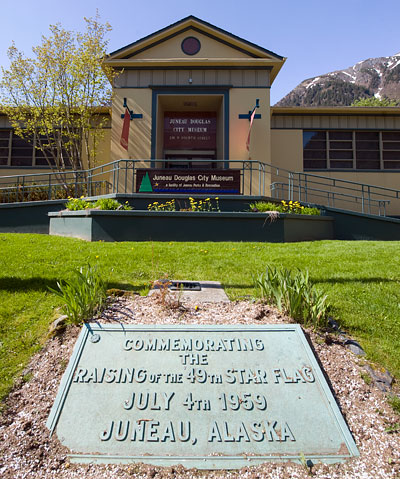National Register of Historic Places in The City and Borough of Juneau
Juneau Memorial Library
114 West Fourth Street
Juneau
The following narrative is paraphrased from the National Register Nomination for the Juneau Memorial Library.
Rev. Herbert Hillerman, president of the Juneau Rotary Club, announced shortly after the end of World War II that the club's top priority would be building a library as to pay tribute to veterans of the two World Wars. Residents raised $82,000 and the federal Public Works Administration provided another $71,000 for construction. Ground was broken 10 September 1950, and the building was dedicated 11 November 1951. At the dedication ceremony, Heintzleman said, "this project represents I think the finest example in this territory of community spirit and enterprise working for a cultural project to benefit old and young, rich and poor'".
The Alaska Statehood Site is also at this location. The first bill for Alaska statehood was introduced in the United States House of Representatives in 1916 by territorial delegate James Wickersham, but statehood was delayed for more than forty years by low population, geographical separation, and uncertainty as to how Alaskans would pay the expenses of statehood. Finally, on 3 January 1959, President Eisenhower signed the proclamation admitting Alaska to the Union.
However, the 49-star flag would not become official until 4 July 1959 when an estimated three thousand citizens stood at attention as the new flag was raised in front of the Juneau Memorial Library by a military honor guard. The Alaska Statehood Site, marked with a commemorative plaque between the flagpoles, was dedicated at the ceremony. Two large weather balloons carrying flags of Alaska and the nation were released in the hopes they would carry the news of Alaska statehood to the rest of the world.
The flagpoles still fly the 49-star American flag and the Alaska flag with the North Star and Big Dipper in gold on a field of midnight blue.



